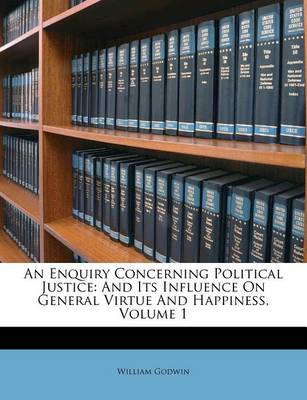Classics
2 total works
When honest young Caleb Williams comes to work as a secretary for Squire Falkland, he soon begins to suspect that his new master is hiding a secret. As he digs deeper into Falkland's past and finally unearths the horrible truth, the results of his curiosity prove calamitous when—even though Caleb has loyally sworn never to disclose what he has discovered—the Squire enacts a cruel revenge. A tale of gripping suspense and psychological power, William Godwin's novel creates a searing depiction of the intolerable persecution meted out to a good man in pursuit of justice and equality. Written to expose the political oppression and corrupt hierarchies its author saw in the world around him, Caleb Williams makes a radical call to end the tyrannical misuses of power.
'To a rational being there can be but one rule of conduct, justice, and one mode of ascertaining that rule, the exercise of his understanding.'
Godwin's Political Justice is the founding text of philosophical anarchism. Written in the immediate aftermath of the French Revolution, it exemplifies the political optimism felt by many writers and intellectuals. Godwin drew on enlightenment ideas and his background in religious dissent for the principles of justice, utility, and the sanctity of individual judgement that drove his powerful critique of all forms of secular and religious authority. He predicts the triumph of justice
and equality over injustice, and of mind over matter, and the eventual vanquishing of human frailty and mortality. He also foresees the gradual elimination of practices governing property, punishment, law, and marriage and the displacement of politics by an expanded personal morality resulting from reasoned
argument and candid discussion. Political Justice raises deep philosophical questions about the nature of our duty to others that remain central to modern debates on ethics and politics.
This edition reprints the first-edition text of 1793, and examines Godwin's evolving philosophy in the context of his life and work.
ABOUT THE SERIES: For over 100 years Oxford World's Classics has made available the widest range of literature from around the globe. Each affordable volume reflects Oxford's commitment to scholarship, providing the most accurate text plus a wealth of other valuable features, including expert introductions by leading authorities, helpful notes to clarify the text, up-to-date bibliographies for further study, and much more.
Godwin's Political Justice is the founding text of philosophical anarchism. Written in the immediate aftermath of the French Revolution, it exemplifies the political optimism felt by many writers and intellectuals. Godwin drew on enlightenment ideas and his background in religious dissent for the principles of justice, utility, and the sanctity of individual judgement that drove his powerful critique of all forms of secular and religious authority. He predicts the triumph of justice
and equality over injustice, and of mind over matter, and the eventual vanquishing of human frailty and mortality. He also foresees the gradual elimination of practices governing property, punishment, law, and marriage and the displacement of politics by an expanded personal morality resulting from reasoned
argument and candid discussion. Political Justice raises deep philosophical questions about the nature of our duty to others that remain central to modern debates on ethics and politics.
This edition reprints the first-edition text of 1793, and examines Godwin's evolving philosophy in the context of his life and work.
ABOUT THE SERIES: For over 100 years Oxford World's Classics has made available the widest range of literature from around the globe. Each affordable volume reflects Oxford's commitment to scholarship, providing the most accurate text plus a wealth of other valuable features, including expert introductions by leading authorities, helpful notes to clarify the text, up-to-date bibliographies for further study, and much more.

